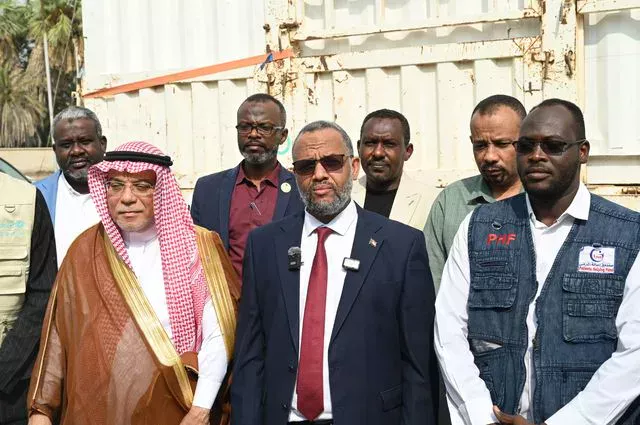Funded by the King Salman Center and implemented by the Patient Relief Fund Organization: Minister of Health and Saudi Ambassador inaugurate oxygen station for Al-Nawa Hospital

Federal Minister of Health: The station will go a long way in meeting the hospital needs of the Karari locality.
Saudi Ambassador: King Salman Center campaigns to support Sudan in its third phase will continue soon
Representative of the Patient Assistance Fund: The distinguished partnership with the King Salmane Humanitarian Aid and Relief Center has contributed to the implementation of numerous projects.
Port Sudan:
The Federal Ministry of Health inaugurated the shipment of the medical oxygen production station and its accessories to Al Nou Hospital, with a grant provided by the King Salman bin Relief and Humanitarian Aid Center Abdulaziz and implemented through the Patient Assistance Fund, in the presence of the Federal Minister of Health, Dr. Haitham Muhammad Ibrahim, and the Ambassador of the Kingdom of Saudi Arabia to Sudan, Ambassador Ali bin Hassan Jaafar, and in the presence of many leaders of the ministry,
The project was implemented through the Sudan Patient Assistance Fund Organization, which is one of the partners of the King Salman Center for the implementation of medical projects in Sudan.
The station is considered one of the vital projects helping to bridge the shortage of medical oxygen services. The capacity of the station is around a thousand bottles per month in addition to a bottle filling device. This station supplies all departments of Al-Naw Hospital. in the locality of Karari.
Federal Minister of Health, Dr. Haitham Muhammad Ibrahim, in a press release today Wednesday in Port Sudan, said the station was provided by the King Salman Center for Relief and Humanitarian Assistance to Al Nou Hospital, which is the largest hospital in Khartoum after the closure of Khartoum hospitals. consequence of the war, which indicates that the station will help fill the major gap in medical oxygen production plants.
Haitham pointed out that the Kingdom of Saudi Arabia is one of the biggest supporters of Sudan among countries in the world, especially in the health sector, pointing out that the station produces more than 1,000 bottles per month with a capacity of 17 cubic meters and He added that the station would help fill the shortage of medical oxygen services. This came after a number of factories that produced these bottles left, and he said they were a big part of providing the service. at the Omdurman Grand Hospital, which provides excellent services in the treatment of the injured and in the wards of newborns and premature babies.
For his part, the Ambassador of the Kingdom of Saudi Arabia to Sudan, Ambassador Ali bin Hassan Jaafar, said that the King Salman bin Abdulaziz Humanitarian Aid and Relief Center supports the Sudanese health sector to alleviate the human suffering of the Sudanese people, thanking the Federal Ministry of Health and its staff, the Humanitarian Aid Commission, for their close monitoring and close coordination to facilitate the introduction of humanitarian and medical aid.
The ambassador revealed the formation of a joint committee between the two countries, revealing that a delegation from the King Salman Humanitarian Aid and Relief Center will visit Sudan in a few days to launch the third phase of emergency relief for the year 2024, worth $15 million, and that the Kingdom of Saudi Arabia will send in the coming days approximately 100 tons of sacrificial meat to distribute to displaced people and needy families.
In the same context, the representative of the Patient Assistance Fund said that the medical oxygen station is one of the distinguished projects and partnerships with the King Salman bin Abdulaziz Relief and Humanitarian Aid Center, especially in the distribution of dialysis machines to certain health centers, and that this project is part of the reconstruction of health institutions and the repair of what was destroyed, he praised the great cooperation of the Federal Ministry of Health and the Humanitarian Aid Commission to facilitate the procedures for delivering humanitarian and medical aid. This project is part of the projects that heal the wounds of the Sudanese people and repair what was destroyed by the war, particularly the health sector.





